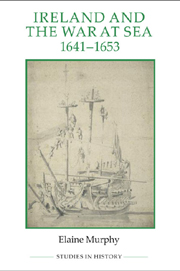Book contents
- Frontmatter
- Contents
- List of figures, maps and tables
- Acknowledgements
- Abbreviations
- Glossary
- Map 1 Ireland, 1641–9: principal ports and locations
- Map 2 The British Isles, 1641–9: principal ports and locations
- Map 3 The British Isles and Europe, 1641–9: principal ports and locations
- Introduction
- PART I The War at Sea, 1651–1653
- Part II Navies and the Conduct of the War at Sea
- 5 A job done well enough? The parliamentary naval effort in Ireland, 1641–1653
- 6 For the defence of the coasts of this realm: the confederate naval effort, 1641–1653
- 7 Fighting the war at sea in Ireland, 1641–1653
- Conclusion
- Appendices
- Bibliography
- General index
- Index of ships
5 - A job done well enough? The parliamentary naval effort in Ireland, 1641–1653
from Part II - Navies and the Conduct of the War at Sea
Published online by Cambridge University Press: 05 April 2013
- Frontmatter
- Contents
- List of figures, maps and tables
- Acknowledgements
- Abbreviations
- Glossary
- Map 1 Ireland, 1641–9: principal ports and locations
- Map 2 The British Isles, 1641–9: principal ports and locations
- Map 3 The British Isles and Europe, 1641–9: principal ports and locations
- Introduction
- PART I The War at Sea, 1651–1653
- Part II Navies and the Conduct of the War at Sea
- 5 A job done well enough? The parliamentary naval effort in Ireland, 1641–1653
- 6 For the defence of the coasts of this realm: the confederate naval effort, 1641–1653
- 7 Fighting the war at sea in Ireland, 1641–1653
- Conclusion
- Appendices
- Bibliography
- General index
- Index of ships
Summary
The role and success of the parliamentary navy in the 1640s and 1650s continues to be debated. J. R. Powell, in his account of the navy in the English civil war, concluded that ‘The adherence of the Navy to Parliament in the English Civil War did much to decide the issue.’ Others are less sure of its importance with Kenneth Andrews suggesting that ‘it did its job well enough’. At first glance quantifying and analysing the naval forces deployed to Ireland and the role that it played in the final parliamentary victory seems relatively straightforward. In reality it is much more complex. This chapter therefore aims to assess the parliamentary naval commitment to the war on the Irish coast between 1641 and 1653 by analysing the strength of the fleets deployed to Ireland, the division between state-owned and -hired men-of-war, the ownership of private warships, the prizes seized by parliamentary shipping and the problems of manning vessels on the Irish coast.
The strength of the parliamentary navy in Ireland, 1641–53
Using the official summer and winter guard lists issued by parliament provides a starting point for establishing details of shipping deployed to Ireland. In some years they included details for each vessel: where it was stationed, the name of the captain, number of guns or sailors, and tonnage. In March 1647, for example, the summer guard named fifty-eight ships with their captains, tonnage, crew, guns and different locations around the British Isles, but in other years the information could be much sparser.
- Type
- Chapter
- Information
- Ireland and the War at Sea, 1641–1653 , pp. 89 - 105Publisher: Boydell & BrewerPrint publication year: 2012



